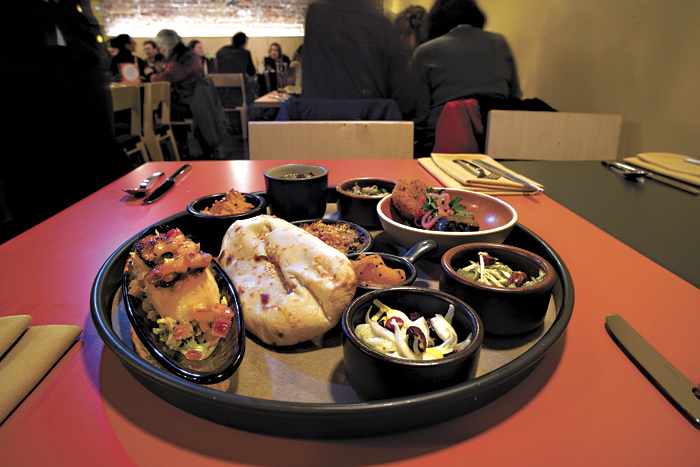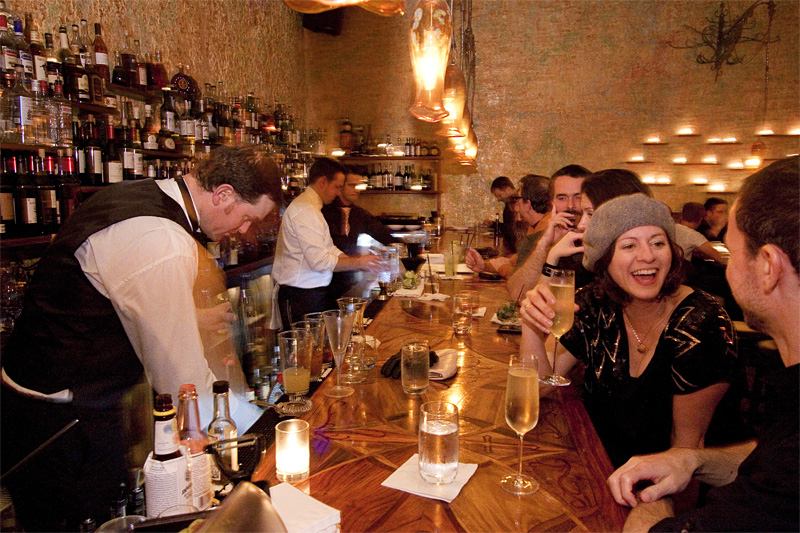Talk about expectations.
Jerry Traunfeld, one of Seattle’s most famous chefs, leaves the four-star Herbfarm after 17 years to go solo. Picks site on Broadway, raising hopes for salvation of the flagging strip. Announces format will not be courses but a single “thali,” a tray filled with 10 tiny dishes of food, modeled after Indian meals. Hires hot-shit pastry chef who has done time under molecular gastronomy gods.
A silent question lurks underneath the buzz: Will dining as we know it be forever changed?
After two encounters with Traunfeld’s three-month-old Poppy, I can’t say that it has. Rather, Poppy is an occasionally brilliant, occasionally off-kilter neighborhood bistro with a smart concept, great tableware, and better cocktails. In fact, once I stopped comparing my experience there against all the hoo-ha, I realized how much I liked the place.
One of Poppy’s most remarkable achievements may be the fact that it draws northern Capitol Hill residents down from their mansions and within spitting distance of actual renters. I’m not talking about rock stars living la vida barista—God forbid they should be seen in a place with metal silverware—but renters with a little money in their checking accounts and a certain regard for tailoring.
In the early evening, the more established of the two demographic segments clusters thickest around the bar, or turns its backs to the liquor shelves and eats bar snacks at a high-seated counter while cruising the dining room. Around 7:00, the expanse of tables in the main dining room starts filling, and by 8:30 the average age has dropped from 45 to 33. Not only does the bustle make the Broadway Business Improvement Association ecstatic, it provides the warmth and movement that the room needs.
Given the orange and saffron accents on everything from the menu to the curtains, Poppy is not self-importantly sleek, but Traunfeld has treated the room like a gallery for his food. Clean lines abound: on the poured-concrete floors and blond woods, the white Nelson pendant lamps, the exposed-brick walls ornamented with a few pieces of pottery. There are more organic sights out back in the parking lot, where Traunfeld has planted raised beds with (currently winterkilled) herbs and greens, keeping his Herbfarm expertise close at hand.
Logistically, the switch from preparing one set menu every night to à la minute cooking—with its faster-paced, more athletic rhythms—is a risky one, especially when the expectations are astronomical. So the chef has compromised. There are a few appetizers and a separate à la carte bar menu, but the main event is Poppy’s nightly thali, which has 10 or so components, only two of which are meat dishes that can be swapped out for vegetarian ones.
In India, thalis are trays packed with tiny bowls containing stir-fries, curries, rices, dals, soup, breads, condiments—even sweets. You dip and combine, sample and scoop, amp up a curry with a bit of pickle or cool the tongue with a dollop of yogurt.
Poppy’s thali is occupied with enough thick-walled, rounded Heath Ceramics bowls to make a design geek weep with envy. On the night I ordered one, a shot glass that looked like it was carved out of the desert contained a velvety parsnip soup haunted by the delicate aromas of bay leaves, vanilla, and cardamom. A low-lipped, solid baking dish the size of a CD contained a cream-drenched chard gratin. A ramekin resembling a Japanese tea mug held finely shaved endive leaves tossed with wine-cured olives and fragrant flecks of citron.
The simultaneous 10-course meal makes for fascinating contrasts. After tasting my way around the tray, I found myself zeroing in on three contrasting dishes, alternating bites of each to see how one segued into the next: A comforting puree of sweet potatoes electrified with ginger and rosemary; a salad of slivered celery, julienned celery root, and hazelnuts, the icy, vegetal character of the celery warmed by the woodsy richness of the nuts; and a spice-coated quail, perfectly roasted in Poppy’s tandoor (a clay-walled pit oven) and paired with a rich compote of pomegranates, walnuts, and onions.
So many flavors jostled for attention, in fact, that the most extreme of them ended up putting me off. Restrained dishes, like cauliflower florets dressed with lemon juice and a faint hint of anchovy, faded into the background. Proving far too intense were pot prawns in a dense curry pulsing with spice and the funk of shrimp stock. The two most overtly Indian elements also jarred: I wasn’t sure what to do with a bitter, sharp mustard-mandarin chutney, since it needed to be mixed with something but overpowered everything it touched. And while I appreciated that the cooks had carefully stuffed a hand-sized flatbread with coriander-scented mashed potatoes, I would have given anything for a couple slices of baguette as a bland respite from the other nine dishes. Another question: What wine do you pair with three dozen herbs and spices? The Alexandria Nicole viognier the waitress recommended worked well enough, but next time I’m ordering a light beer.
For $32, the price of a New York strip at a half-dozen of the city’s steakhouses, Traunfeld packs a lot of dining onto one platter. But one of the thali’s pitfalls is that it’s a complete experience in itself. I had to return to properly enjoy appetizers like Traunfeld’s eggplant fries, the crisp-creamy wedges dusted with equal parts salt and honey, and salt-cod fritters, as light as a clump of down, served with a smoked-paprika mayonnaise.
The thali also takes away any appetite for pastry chef Dana Cree’s elaborate, intellectually composed desserts. For people who refuse to order any other kind of dessert, there’s a dark chocolate terrine, garnished with candied ginger and a paste of black sesame seeds, orange, and cloves. And a bowl of date cake cubes with salted pecans and butterscotch sauce, epically rich without being sticky, is a little like Anaïs Nin’s erotica: Sure, you’re reading it to get off, but you’re enjoying the author’s turns of phrase while doing so.
Despite the revolutionary aura of Traunfeld’s thali, when I go back to Poppy—and I will, since it’s annoyingly close to my apartment—I will be sitting near the bar. Not for the chance to order bar snacks: The à la carte entrée I tried there, a spice-rubbed duck confit with farro and a huckleberry sauce, was dry, burned around the edges, and salty as all get-out. No, I’ll probably go for the “smali,” the human-sized version of the thali, which has one larger dish and four tiny accompaniments. At $22, it’s priced affordably enough for me to eat weekly.
Just as critically, I’ll be there for the cocktails, the perfect extension of Traunfeld’s gift for combining flavors. The papi delicious, which somehow mixes the flavors of red bell peppers, chiles, and bitter orange to bring out all tequila’s vegetal notes, is a gustatory illusion, flickeringly savory and sweet. And the Lookout combines Plymouth gin, Aperol, yellow Chartreuse, and mandarin orange in a clear orange elixir with the ominous glint of a newly sharpened knife and the perfume of an Ottoman harem. Every sip exceeds expectations.
PRICE CHECK
Thali: $32
Smali: $22
Eggplant fries: $5
Salt-cod fritters: $7
Duck confit: $14
Chocolate terrine: $6
Papi delicious: $10






